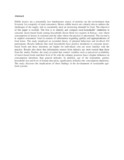| dc.contributor.author | Pambo, K. O. | |
| dc.contributor.author | Mbeche, R. M. | |
| dc.contributor.author | Okello, J. J. | |
| dc.contributor.author | Mose, George N. | |
| dc.contributor.author | Kinyuru, J. N. | |
| dc.date.accessioned | 2021-04-19T08:38:25Z | |
| dc.date.available | 2021-04-19T08:38:25Z | |
| dc.date.issued | 2018-12 | |
| dc.identifier.citation | Agriculture and Human Values. ISSN 1572-8366. 35:4. pp. 885–898 | en_US |
| dc.identifier.uri | https://ideas.repec.org/a/spr/agrhuv/v35y2018i4d10.1007_s10460-018-9881-5.html | |
| dc.identifier.uri | https://www.researchgate.net/publication/327188720_Intentions_to_consume_foods_from_edible_insects_and_the_prospects_for_transforming_the_ubiquitous_biomass_into_food | |
| dc.identifier.uri | https://cipotato.org/publications/intentions-to-consume-foods-from-edible-insects-and-the-prospects-for-transforming-the-ubiquitous-biomass-into-food/ | |
| dc.identifier.uri | https://agris.fao.org/agris-search/search.do?recordID=US201900026487 | |
| dc.identifier.uri | http://library.kisiiuniversity.ac.ke:8080/xmlui/handle/123456789/930 | |
| dc.identifier.uri | http://hdl.handle.net/123456789/4581 | |
| dc.description.abstract | Edible insects are a potentially less burdensome source of proteins on the environment than livestock for a majority of rural consumers. Hence, edible insects are a timely idea to address the challenges of the supply side to sustainably meet an increasing demand for food. The objective of this paper is twofold. The first is to identify and compare rural-households’ intentions to consume insect-based foods among households drawn from two regions in Kenya—one where consumption of insects is common and the other where the practice is uncommon. The second is to explore consumers’ trust in sources of information regarding quality and appropriateness of food items. The study employed an extended theory of planned behaviour and involved 432 participants. Results indicate that rural households have positive intentions to consume insect-based foods and those intentions are higher for individuals who are more familiar with the practice. Results also show that information sources from industry are more trusted than those from the media. Further, the study revealed that control variables such as perceived availability of insect-based foods and their level of fit with the culinary practices have a higher influence on consumption intentions than general attitudes. In addition, age of the respondent, gender, household size and level of formal education, significantly influence the consumption intentions. The study discusses the implications of these findings in the development of sustainable agri-food systems. | en_US |
| dc.language.iso | en | en_US |
| dc.title | Intentions to consume foods from edible insects and the prospects for transforming the ubiquitous biomass into food | en_US |
| dc.type | Article | en_US |

